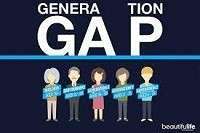
Generation Gap and Its Impact on the Society
The generation gap is a term popularized in western countries during the 1960 s referring to differences between people of younger generations and their elders, especially between children and their parents.
Although some generational differences have existed throughout history, modern generation gaps have often been attributed to rapid cultural change in the modern and postmodern period, particularly with respect to such matters as musical tastes, fashion, technology and politics.
These changes are assumed to have been magnified by the unprecedented size of the young generation during the 1960, which gave it the power and inclination to rebel against societal norms.
Ours is a transient world. It is changing at a very rapid rate. The things of today become obsolete tomorrow. The era in which a person was born affects their view of the world and significant events during this time mould their outlook and shape their values. Each generation has distinct attitudes, behaviours, expectations and habits. Hence, the problem of the generation gap is universal and everybody across the globe faces this immovable problem.
However, this problem gets intensified in countries like India where joint family culture has always existed. Our grandfathers never had even dreamt about the type of technology that we use today. Moreover, our culture has been also influenced by world culture throughout the years. Many aspects that were considered to be a taboo earlier, have become a part of the mainstream now.
Even if the generation gap between elders and youngsters is not a new phenomenon, with technology, it has reached to its peak. Grandparents complain about the behavioural changes in youngsters, grandchildren in particular.
Day by day, grandparents are being deprived of the affection and tenderness of grandchildren. One of the foremost arguments brought forward by grandparents is that the generation of today is too involved in technology.
Technology has been dipped in their lives to such an extent that grandchildren hardly find time to spend with their grandparents. Nonetheless, bridging the gap between grandparents and grandchildren is possible but with a little willingness on the part of the elders to adapt themselves in this fast-changing society.
Both the grandparents and the grandchildren should complement each other’s action not only to promote education but moral values as well. Children are unaware of the importance of their elders. It is pitiful to see the way children address their grandparents nowadays.
Many of our elderly live out their last years either in retirement communities or nursing homes-separated from the rest of the society. In fact, senior citizens are more prone to social isolation than any other segment of society, making them highly susceptible to dementia and depression. If isolation and lack of socialising can lead to dementia and depression, then it stands to reason that being social and building relationships (particularly intergenerational) could have the opposite effect.
Communication and tolerance are the only ways in which this gap can be bridged. The youngsters must understand that the elders have a lot to teach them. The elders have been through all what the youngsters would face in their lives and thus, for youngsters, they are like encyclopedias of firsthand knowledge.
On the other hand, the elders must realize that the world will not be the same always. Hence, they too have a lot to learn from the youngsters. They also have to move on according to the ways of the changing world. The only thing that both parties can try is accept each other’s thoughts and show some more respect.